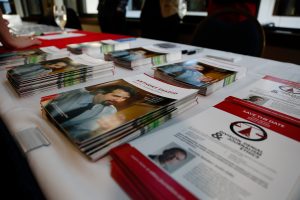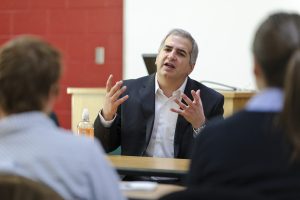 The Center for Journalism Ethics at the University of Wisconsin-Madison seeks nominations for the Anthony Shadid Award for Journalism Ethics. Now in its 15th year, the Shadid Award recognizes ethical decisions in reporting stories in any medium, including print, broadcast and digital, by journalists working for established news organizations or publishing independently.
The Center for Journalism Ethics at the University of Wisconsin-Madison seeks nominations for the Anthony Shadid Award for Journalism Ethics. Now in its 15th year, the Shadid Award recognizes ethical decisions in reporting stories in any medium, including print, broadcast and digital, by journalists working for established news organizations or publishing independently.
The award focuses on current journalism and does not include books, documentaries and other long-term projects. Entries should involve reporting done for stories that were published or broadcast in 2023. Individuals or news organizations may nominate themselves or others. A single news organization can submit no more than three nominations.
The nomination window will open on November 13, 2023.
Deadline for submissions is January 16, 2024.
The Shadid Award includes a $5,000 prize and travel expenses to accept the award and discuss the reporting at an awards ceremony held in Washington, DC in the spring.
The Shadid Award is different from other journalism prizes in that it seeks to recognize the difficult, behind-the-scenes decisions reporters make in pursuing high-impact stories and in fulfilling their ethical obligations to sources, to people caught up in news events, and to the public at large.
“The prize recognizes the difficult ethical decisions journalists face when producing stories that necessarily affect the people and communities they report on, their readers, and even themselves,” says Kathryn McGarr, chair of the judging committee. “We are pleased to be able to honor the memory of Anthony Shadid by highlighting work that is made with such care for its consequences.”
Previous winners of the award include:
- 2023: Mystyslav Chernov, Lori Hinnant, Evgeniy Maloletka, Vasilisa Stepanenko, Associated Press
- 2022: Jessica Contrera, Washington Post
- 2021: Margie Mason and Robin McDowell, Associated Press
- 2020: Lakeidra Chavis and Jodi S. Cohen, ProPublica & Jennifer Smith Richards, Chicago Tribune
- 2019: Julie K. Brown and Emily Michot, Miami Herald
- 2018: Brian Grow and John Shiffman, Reuters
- 2017: Shane Bauer, Mother Jones
- 2016: Martha Mendoza, Margie Mason, Robin McDowell and Esther Htusan, Associated Press
- 2015: David Jackson, Gary Marx, Duaa Eldeib and Anthony Souffle, Chicago Tribune
- 2014: Adam Goldman, Matt Apuzzo and Ted Bridis, Associated Press
A graduate of UW-Madison, Anthony Shadid died in 2012 on a reporting assignment in Syria for the New York Times. He won two Pulitzer Prizes for his courageous and insightful foreign correspondence. Shadid sat on the the Center for Journalism Ethics advisory board and strongly supported its efforts to promote public interest journalism and to stimulate discussion about journalism ethics.
Letters of nomination must include:
- Name and contact information of the nominators and their relationship to the story
- Names and emails of the reporter or reporting team that produced the report
- Brief description of the story and a link to it online. If you are submitting a series longer than three stories, please highlight the three that you want to get the closest consideration. We will take into account the whole series.
- Description of conflicting values encountered in reporting the story
- Options considered to resolve the conflicts
- Final decisions and rationales behind them
Nomination letters of three pages or less should be saved in pdf format and attached to an email sent to ethicsaward@journalism.wisc.edu
Deadline for submissions is January 16, 2024.
By entering this competition, you grant the Center for Journalism Ethics permission to use your entry as a positive example of ethical decision-making.
If you are chosen as a finalist, your nomination letter will be posted on our website and your work may be selected for inclusion in the Shadid Curriculum, our ethics curriculum for student journalists. If this happens, we may ask you to provide a PDF of your story outside of your news organization’s paywall. If there is anything within the nomination letter that needs to be kept confidential, please let us know.
FAQs
What is the Shadid Award for Journalism Ethics?
The Anthony Shadid Award for Journalism Ethics recognizes outstanding application of ethical standards by an individual journalist or group of journalists. The award is named after Anthony Shadid, a University of Wisconsin-Madison alumnus and foreign reporter for the Washington Post and The New York Times. Mr. Shadid won two Pulitzer Prizes for his courageous and informed journalism. In February 2012, he died from health complications while crossing the Syrian border.
When are nominations due to the committee?
January 16, 2024
Who should I nominate?
Yourself, a journalist, or a group of journalists who has exhibited outstanding commitment to ethical standards in the publication of important public journalism during 2023.
Is there a cost to nominate someone?
No, it is free.
What kind of publications are not accepted?
Documentaries and books are not accepted. We seek journalism published in any other medium, though, including but not limited to websites, newspapers, radio, television, and digital platforms.
What should I submit to the committee?
Send the committee a letter no more than three pages. Include the name and contact information of the nominator and the nominator’s relationship to the story, and the names and emails of the reporter or reporting team. Additionally, the letter should include:
- A brief description of the story and a link to it online.
- The conflicting values encountered in reporting.
- The options considered to resolve the conflict.
- The final decision and the rationale for making it.
How do I submit nominations?
Send the nomination letter in PDF format to ethicsaward@journalism.wisc.edu.
When will the finalists be announced?
The committee expects to narrow the nominations to finalists in late February.
What does the winner receive?
The award includes a $5,000 prize and travel expenses to accept the award and discuss the reporting at a ceremony in Washington, DC in spring of 2024.
About Anthony Shadid

On Dec. 2, 2010, foreign correspondent for the New York Times Anthony Shadid (center) speaks to a group of journalism students in a Vilas Hall classroom at the University of Wisconsin-Madison. Shadid is a UW-Madison alumnus and two-time Pulitzer Prize winner. (Photo by Bryce Richter / UW-Madison)
A graduate of the UW-Madison, Anthony Shadid died in 2012 while crossing the Syrian border on a reporting assignment for the New York Times. He won two Pulitzer Prizes for his courageous and insightful foreign correspondence. Shadid sat on the ethics center’s advisory board and strongly supported its efforts to promote public interest journalism and to stimulate discussion about journalism ethics.
Shadid won the Pulitzer Prize for international Reporting in 2004 for his coverâge of the U.S. invasion of Iraq and the occupation that followed. He won the Pulitzer Prize again in 2010 for his coverâge of Iraq as the United States began its withdrawal. In 2007, he was a finalist for the Pulitzer Prize for his coverage of Lebanon and the war there with Israel. He has also received the Arthur Ross Award for Distinguished Reporting & Analysis onForeign Affairs (2009), the American Society of Newspaper Editors’ award for deadline writing (2004), the Overseas Press Club’s Hal Boyle Award for best newspâper or wire service reporting from abroad (2004) and the George Polk Award for foreign reporting (2003).
In 1997, Shadid was awarded a citation by the Overseas Press Club for his work on “Islam’s Challenge.” The four-part series, published by the AP in December 1996, formed the basis of his book, Legacy of the Prophet: Despots, Democrats and the New Politics of Islam, published in December 2000. His second book, Night Draws Near: Iraq’s People in the Shadow of America’s War, was published in September 2005. Night Draws Near won the prestigious Los Angeles Times Book Prize for Current Issues and the Ron Ridenhour Book Prize. It was also a nominee for the National Book Critics Circle Award for General Nonfiction and was a New York Times Notable Book of the Year. His last book, House of Stone: A Memoir of Home, Family and a lost Middle East, was published in Spring 2012.
Shadid was passionate about staying connected with the J-School and The Daily Cardinal, the student newspaper that gave him his start in journalism. He returned regularly to give guest lectures and generously mentored students even while he was reporting abroad. Asked once what he missed most from his time in Madison, Shadid smiled and answered, “The Cardinal, of course.”
In December 2010, Shadid gave the inaugural CJE ethics lecture. His powerful speech, The Truths We Tell: Reporting on Faith, War and the Fate of Iraq, conveys Shadid’s commitment to the highest ideals of journalism.
The Anthony Shadid Memorial Fund
The Anthony Shadid Memorial Fund will benefit students interested in international reporting. The fund is named in honor of Anthony Shadid, a UW-Madison graduate who died in 2012 while reporting on Syria for the New York Times. He won two Pulitzer Prizes for his courageous and insightful foreign correspondence. Shadid sat on the Center for Journalism Ethics advisory board and strongly supported our efforts to promote public interest journalism and to stimulate discussion about journalism ethics.
